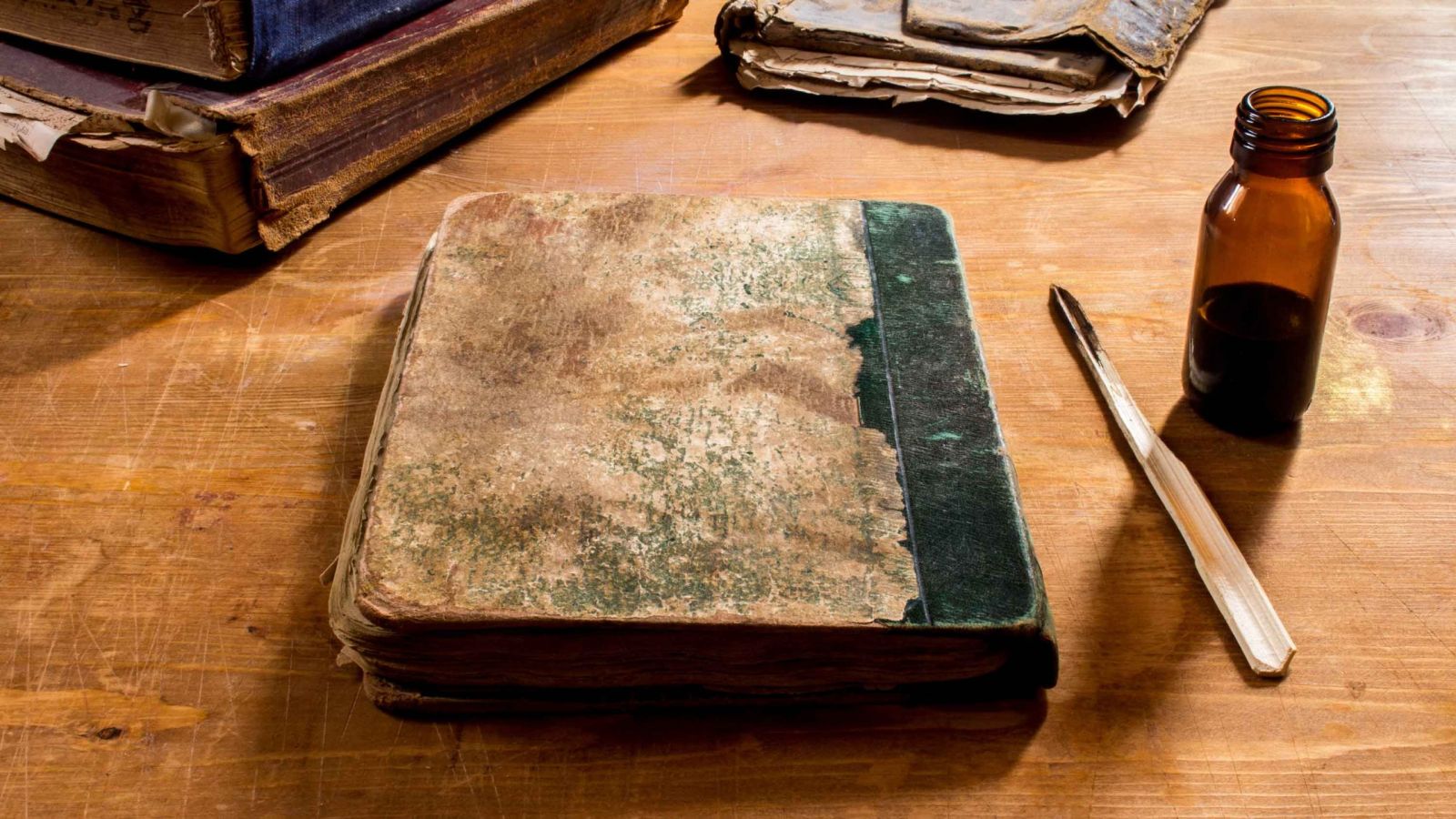When Were Ḥadīth First Written?
Al-ʿAllāmah Ibn Kathīr, Al-ʿAllāmah Muḥammad Shākir


Bukhārī related from Abī Hurayrah that he said, ‘None from amongst the Companions of the Messenger of Allāh (ṣallallāhu ʿalayhi wa-sallam) had more ḥadīths than me, except for ʿAbdullāh ibn ʿUmar. Verily he used to write, and I did not write.’
Al Ḥāfiẓ Ibn Kathīr said:1
Indeed, it is mentioned in Ṣaḥīḥ Muslim from Abī Saʿīd al-Khudrī in marfūʿ’2 form, ‘Whoever writes from me something other than the Qurʾān, then let him erase it.’
Ibnus al-Ṣalāh said, ‘And from what has been narrated to us about it is that it was disliked by: ʿUmar, and Ibn Masʿūd, and Zayd Ibn Thābit, and Abū Mūsá, and Abū Saʿīd in a group of latecomers from the Companions, and the following generation.’
He also said, ‘And from what has been reported to us regarding the permissibility of that or doing it: ʿAlī, and his son al-Ḥasan, and Anas, and ʿAbdullāh Ibn ʿUmar Ibn al ʿĀs in a group from amongst the Companions and the following generation.’
I say, that it has been established in the two Ṣaḥīḥs that the Messenger of Allāh (ṣallallāhu ʿalayhi wa-sallam) said, ‘Write for Abī Shāḥ.’ And indeed, we clarified this topic in the introductions of our first books. And for Allāh is the praise.
al-Bayḥaqī and Ibnus al-Ṣalāh and more than one other than them have said: Perhaps the prohibition of that was for when it was feared that it would get mixed in with the Qurʾān, and then afterward, it was secured from that. And Allāh knows best.
Indeed, it was related from the scholars of later times that they agreed upon the permissibility of writing the ḥadīths, and this matter is exhaustive, widespread, and well known, without disapproval.
Shaykh Aḥmad Shākir said:
The older Companions differed about the writing of ḥadīths. Some of them disliked it because of the ḥadīth of Abī Saʿīd al-Khudrī, that the Messenger of Allāh said, “Do not write from me anything except the Qurʾān, and whoever writes from me something other than the Qurʾān, then let him erase it.” Related by Muslim in his Ṣaḥīḥ, and by Ibn Sa’ad (6/63) from ʿUbaydah as-Salmānee from the older tābiʿīn,3 and verily, the times of ignorance were realized after being written and erased. Most of the Companions were upon permitting the writing, and this is the correct statement. And indeed, the scholars have answered the ḥadīth of Abī Saʿīd with many answers. So some of them state that the ḥadīth is mawqūf4 on him, and this is not good, for verily the ḥadīth is authentic. And they have answered with other than this, saying that the prohibition was only for writing the ḥadīths with the Qurʾān on one piece of paper, fearing that the two would get mixed up by one who was not knowledgeable about the beginning of Islām.
And other late comers answered that the prohibition from that was particular to the one who was reliable in memorizing it. It was feared that he would rely on writing, but if one is not reliable in memorization, then he should write. Indeed, none of these answers are decisive.
The Correct Answer
The prohibition was abrogated by other ḥadīths showing it’s permissibility.
So indeed Bukhārī, and Muslim relate that circumstances required Abī Shāḥ to have something written from the Messenger of Allāh (ṣallallāhu ʿalayhi wa-sallam), which he heard in his sermon. This was in the year of the victory over Makkah. So he (ṣallallāhu ʿalayhi wa-sallam) said, “Write for Abī Shāḥ.”
Abū Dāwūd, and al-Ḥākim and other than these two relate from ʿAbdullāh Ibn ʿUmar Ibn al ʿĀs who said, “I said, ‘O Messenger of Allāh (ṣallallāhu ʿalayhi wa-sallam), verily I heard something from you, so can I write it?’ He said, ‘Yes.’ I said, ‘In happiness and anger?’ He said, ‘Yes, for verily I do not speak in these two except truth.'”
Bukhārī related from Abī Hurayrah that he said, “No one from among the Companions of the Messenger of Allāh Allāh (ṣallallāhu ʿalayhi wa-sallam) had more ḥadīths than me, except for ʿAbdullāh Ibn ʿUmar. Verily he used to write, and I did not write.”
Tirmidthī related from Abī Hurayrah that he said, “A man from the Ansār was sitting with the Messenger of Allāh (ṣallallāhu ʿalayhi wa-sallam). So he heard a ḥadīth from him, and it amazed him, but he could not memorize it. So he complained to the Messenger of Allāh (ṣallallāhu ʿalayhi wa-sallam). So he (ṣallallāhu ʿalayhi wa-sallam) said, ‘Use your right hand.’ And he signaled with his hand to writing.”
These ḥadīths, along with the affirmation of this action by the majority of the Companions, and the second generation, then the agreement of the Ummah after that upon its permissibility – all of this proves that the ḥadīth of Abī Saʿīd is abrogated, and that was the beginning of the matter when it was feared that it would distract them from the Qurʾān, and when it was feared that other than the Qurʾān would become mixed up with the Qurʾān. And in the Musnad (no. 7276) and in the Tabaqaat of Ibn Sa’ad (5/209) is what proves that a ḥadīth was written for a lame man by them, and he read from it.
And the ḥadīth of Abī Shāḥ came in the last stages of the life of the Prophet (ṣallallāhu ʿalayhi wa-sallam), and like that were the narrations of Abī Hurayrah. And it was in Islām’s later stages that ʿAbdullāh Ibn ʿUmar used to write, and he (Abū Hurayrah) did not write, proving that ʿAbdullāh Ibn ʿUmar used to write after Abī Hurayrah came to Islām. If the ḥadīth of Abī Saʿīd of prohibition was after these ḥadīths of permission and permissibility, then that would have been known by the Companions with unadulterated faith. Instead, there came the decisive agreement of the whole Ummah after the conclusive proof that the permission of the matter was in later times. It is an agreement affirmed by many recurrent actions from every group from amongst the Ummah after the first period. May Allāh have mercy upon them all.
Indeed, Ibn al-Ṣalāh said: “Then all that differing ceased, and all the Muslims agreed upon writing that being permissible, and were it not for writing them in the books for the lessons…” And indeed, he spoke the truth. May Allāh have mercy upon him.
And from what proves that the writing of ḥadīths has preceded from the older times of the Companions is what is found in Tahdheeb (1/470) in the biography of Bashīr Ibn Nūḥayk. Yahyá Ibn al-Qattaan said: “From ʿImrān Ibn Hadheer: From Abī Majliz: From Bashīr Ibn Nūḥayk who said: I came to Abī Hurayrah with my book which I used to write in. So I read to him from it and I said: I heard this from you. He said: Yes.” And this text is also related by Tirmidthī (4/396), and by al-Khaṭīb in al-Kifāyah (no. 283), and Ibn Sa’ad (7/1/no. 162)
Endnotes:
[1] The above is taken from al-Bāʾith al Ḥathīth Sharḥ Ikhtiṣār ‘Ulūm al Ḥadīth p. 129-130.
[2] “marfūʿ'” This comes from the Arabic root word, ‘rafaʿa’, which means: to be raised, or to raise. Marfoo’ means something which is raised, in this case – a marfūʿ’ narration is one that stops at a Companion in the chain of narration, but the text is such that none other than the Prophet (ṣallallāhu ʿalayhi wa-sallam) could have spoken it. It is used when the Companion does not state that he heard the narration from the Prophet (ṣallallāhu ʿalayhi wa-sallam), as is the case here.
[3] “tābiʿīn” This comes from the Arabic root word, ‘tabaʿa’ which means ‘to follow.’ The singular version of tābiʿīn is tābiʿī, which is a person from the second generation of Muslims.
[4] “mawqūf” comes from the Arabic root ‘waqafa’ which means “suspended”, technically – what is attributed to the Companions. It is also used for other than the Companions if restricted, e.g. mawqūf from az-Zuhree.
Some of the scholars have stated that this ḥadīth by Abū Saʿīd al-Khudrī was not a ḥadīth at all, rather it was his own opinion. Shaykh Aḥmad Shākir counters this argument by saying that it is authentic, meaning that it is a statement which could not have been said by other than the Prophet (ṣallallāhu ʿalayhi wa-sallam) because it contains instruction about the preservation of Islām.
Translated by Maaz Qureshi

















